The Scots song "Ae fond kiss and then we sever" by the Scottish poet Robert Burns is more commonly known as "Ae fond kiss". It is Burns's most recorded love song.
The Scots song "Ae fond kiss and then we sever" by the Scottish poet Robert Burns is more commonly known as "Ae fond kiss". It is Burns's most recorded love song.

After the publication of his collected poems, the Kilmarnock volume, Burns regularly travelled and stayed at Edinburgh. While there he established a platonic relationship with Mrs Agnes Maclehose and they began a regular correspondence using the pseudonyms "Clarinda" and "Sylvander". Burns wrote "Ae fond kiss" after their final meeting and sent it to Maclehose on 27 December 1791 before she departed Edinburgh for Jamaica to be with her estranged husband. [1] [2]
The letter [2] is held by National Library of Scotland as part of the Watson Autograph collection of manuscripts. [3]
Burns's original setting of three verses in eight lines was set to the tune of "Rory Dall's Port". The musical score [4] was published in the collection of Scottish folks songs known as the Scots Musical Museum . (The melody playable on the link here is not "Rory Dall's Port", but perhaps is now more associated with the words than the original.)


A Burns supper is a celebration of the life and poetry of the poet Robert Burns, the author of many Scots poems. The suppers are normally held on or near the poet's birthday, 25 January, known as Burns Night also called Robert Burns Day or Rabbie Burns Day. However, in principle, celebrations may be held at any other time of the year. Burns suppers are held all around the world.

The Scots Musical Museum was an influential collection of traditional folk music of Scotland published from 1787 to 1803. While it was not the first collection of Scottish folk songs and music, the six volumes with 100 songs in each collected many pieces, introduced new songs, and brought many of them into the classical music repertoire.
The "Lyke-Wake Dirge" is a traditional English folk song and dirge listed as number 8194 in the Roud Folk Song Index. The song tells of the soul's travel, and the hazards it faces, on its way from earth to purgatory, reminding the mourners to practise charity during lifetime. Though it is from the Christian era and features references to Christianity, much of the symbolism is thought to be of pre-Christian origin.
"Highland Laddie", also known as "Hielan' Laddie", is the name of a Scottish popular folk tune "If Thou'lt Play Me Fair Play", but as with many old melodies various sets of words can be sung to it, of which Robert Burns's poem "Highland Laddie" is probably the best known. "If Thou'lt Play Me Fair Play" has been reworked several times since Burns set down his words, Donkey Riding being one variant.
"Over the Hills and Far Away" is a traditional British song, dating back to at least the late 17th century. One version was published in Thomas D'Urfey's Wit and Mirth, or Pills to Purge Melancholy; a very different one appeared in George Farquhar's 1706 play The Recruiting Officer. A version also appears in John Gay's The Beggar's Opera of 1728.
"The Parting Glass" is a Scottish traditional song, often sung at the end of a gathering of friends. It has also long been sung in Ireland, where it remains popular and has strongly influenced how it is often sung today. It was purportedly the most popular parting song sung in Scotland before Robert Burns wrote "Auld Lang Syne".
"Annie Laurie" is an old Scottish song based on a poem said to have been written by William Douglas of Dumfriesshire, about his romance with Annie Laurie (1682–1764). The words were modified and the tune was added by Alicia Scott in 1834/5. The song is also known as "Maxwelton Braes".

Ae Fond Kiss... is a 2004 romantic drama film directed by Ken Loach, and starring Atta Yaqub and Eva Birthistle. The title is taken from a Scottish song by Robert Burns, the complete line being "Ae Fond Kiss, and then we sever..."
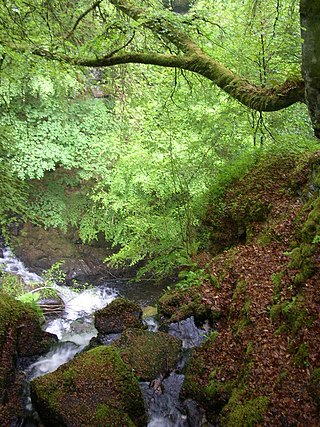
"The Birks of Aberfeldy" is a song lyric written for a pre-existing melody in 1787 by Robert Burns. He was inspired to write it by the Falls of Moness and the birch trees of Aberfeldy during a tour of the Scottish Highlands with his friend William Nicol.
James Oswald (1710–1769) was a Scottish composer, arranger, cellist, and music publisher, who was appointed as Chamber Composer for King George III and also wrote and published many Scottish folk tunes.
Lord Saltoun and Auchanachie, also known as Annachie Gordon, is a Scottish ballad.
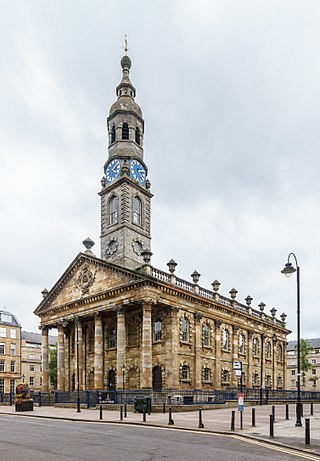
St Andrew's in the Square is an 18th-century category-A-listed former church in Glasgow, Scotland, considered one of the finest classical churches in Scotland, and now Glasgow's Centre for Scottish Culture, promoting Scottish music, song and dance. The church is in St Andrew's Square, near Glasgow Cross and Glasgow Green, on the edge of the City's East End.
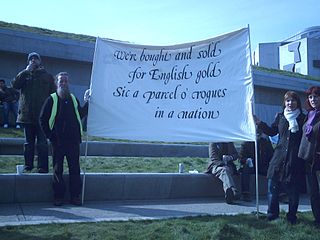
"Such a Parcel of Rogues in a Nation" is a Scottish folk song whose lyrics are taken from a poem written by Robert Burns in 1791, listed as number 5516 in the Roud Folk Song Index. It has continued to be associated with Scottish nationalism and also been referenced in other situations where politicians' actions have gone against popular opinion.

The Canongate Kirkyard stands around Canongate Kirk on the Royal Mile in Edinburgh, Scotland. The churchyard was used for burials from the late 1680s until the mid-20th century.
Bob Cranky's Adieu is a Geordie folk song written in the 19th century by John "Jack" Shield, in a style deriving from music hall.
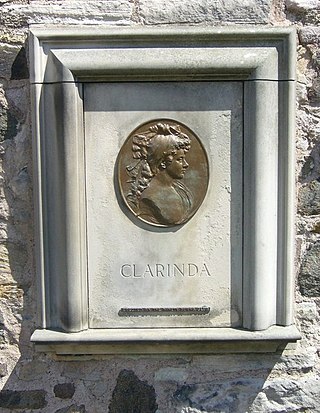
Agnes Maclehose, or Agnes Craig, known to her friends as Nancy and to Robert Burns followers as Clarinda, was a Scotswoman who had an unconsummated affair with Burns during 1787-88, on which he based the 1791 song "Ae Fond Kiss". The pseudonyms of her "Clarinda" to his "Sylvander" were adopted by the pair for confidential correspondence purposes. Maclehose, used here throughout, has been various styled, including "McLehose", "MacLehose" and "M'Lehose".
Ruairí Dall Ó Catháin may have been an Irish harper and composer. Recent research, however, raises the question whether he ever really existed. He is said to have been born circa 1580 in County Antrim and to have died circa 1653 at Eglinton Castle.

Ay Fond Kiss is the second album released by British group Fairground Attraction. It was released on 18 June 1990. The title is a misspelling of the Robert Burns poem "Ae Fond Kiss", which lead singer Eddi Reader also covered on her 2003 album Sings the Songs of Robert Burns. The album consists mostly of unreleased recordings and B-sides to previously released singles. The album was also released after Reader had left the group. It peaked at number 55 in the UK Albums Chart.
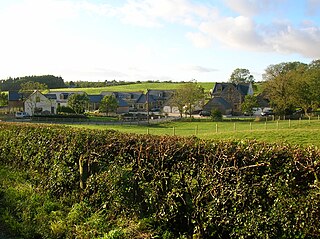
Handsome Nell was the first song written by Robert Burns, often treated as a poem, that was first published in the last volume of James Johnson's Scots Musical Museum in 1803 (No.551) with an untitled tune. Burns recorded in holograph on page three of his first Commonplace Book that he wrote the song or Rhyme at the age of only fifteen whilst living at Mount Oliphant Farm, it is regarded as his earliest production, inspired by a farm servant aged fourteen, named either Nelly Kilpatrick or Nelly Blair. Some confusion exists as he also gave his age as 16 in his autobiographical letter to Dr. Moore; the autumn of 1774 is generally accepted.

Still Time is the fifth solo (studio) album by Karen Matheson, lead singer of the Scottish folk band Capercaillie, released on CD and vinyl on 12 February 2021.